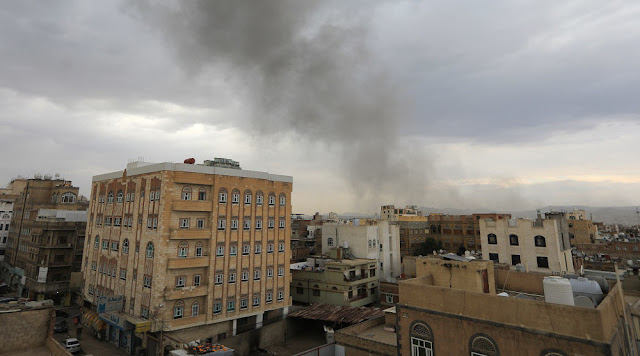On September 11, 2025, Iran’s Foreign Ministry issued a strong condemnation of recent Israeli airstrikes targeting Yemen’s Hodeidah port, describing the attacks as a flagrant violation of international law and a deliberate attempt to exacerbate tensions across the Middle East. The strikes, which occurred in the strategic coastal city, have drawn widespread attention due to their potential to further destabilize an already volatile region. Iran’s statement reflects growing concerns about the broader implications of Israel’s military actions, particularly in the context of Yemen’s ongoing conflict and the fragile humanitarian situation in the war-torn country.
Details of the Israeli Airstrikes on Hodeidah
According to reports, the Israeli military conducted airstrikes on key infrastructure in Hodeidah, a vital port city on Yemen’s western coast. Hodeidah serves as a critical lifeline for the delivery of humanitarian aid and commercial goods to millions of Yemenis, who have been grappling with the devastating effects of a decade-long conflict. The port is one of the few remaining entry points for essential supplies, including food, medicine, and fuel, making it a linchpin in Yemen’s survival amid a prolonged blockade and economic collapse.
The Israeli military has not publicly disclosed the precise targets of the airstrikes, but local sources indicate that the attacks struck facilities allegedly linked to Yemen’s Ansarullah movement, also known as the Houthis. The Houthis, who control Hodeidah and much of northern Yemen, have been engaged in a protracted conflict with a Saudi-led coalition since 2015, with the war causing widespread devastation and one of the world’s worst humanitarian crises. Israel’s decision to target Hodeidah has raised questions about its strategic objectives, with analysts suggesting that the strikes may be part of a broader effort to counter the Houthis’ growing influence in the region, particularly their maritime activities in the Red Sea.
Iran’s Foreign Ministry, in its statement, described the airstrikes as “an act of aggression” that violates Yemen’s sovereignty and undermines international efforts to resolve the conflict. The ministry accused Israel of seeking to inflame regional tensions at a time when diplomatic initiatives are underway to broker a ceasefire in Yemen. “Such reckless actions not only endanger the lives of innocent civilians but also threaten to drag the region into a wider conflict with catastrophic consequences,” the statement read.
Iran’s Position and Regional Dynamics
Iran’s condemnation of the Israeli airstrikes is consistent with its long-standing support for the Houthi movement, which it views as a key ally in its broader geopolitical strategy to counter Western and Israeli influence in the Middle East. Tehran has repeatedly denied providing direct military support to the Houthis, though it acknowledges offering political and moral backing to the group. The Houthis, for their part, have aligned themselves with the so-called “Axis of Resistance,” a coalition of Iran-backed groups that includes Lebanon’s Hezbollah and various Palestinian factions, all of which oppose Israel and its allies.
The Israeli airstrikes on Hodeidah come at a time of heightened tensions between Iran and Israel, fueled by a series of tit-for-tat actions across the region. In recent years, Israel has conducted numerous strikes on Iranian-linked targets in Syria, Iraq, and Lebanon, citing the need to prevent the transfer of advanced weaponry to groups like Hezbollah. Iran, in turn, has accused Israel of pursuing a policy of regional domination, pointing to its military interventions and alliances with Western powers, particularly the United States.
The Hodeidah strikes also follow a series of Houthi attacks on commercial shipping in the Red Sea, which the group claims are aimed at vessels linked to Israel or its allies. These attacks have disrupted global trade routes, prompting the United States and its allies to deploy naval forces to the region under the banner of Operation Prosperity Guardian. The Houthis have justified their actions as a response to Israel’s ongoing military operations in Gaza, where the conflict has resulted in tens of thousands of deaths and widespread destruction since October 2023.
Humanitarian Implications of the Airstrikes
The targeting of Hodeidah’s port infrastructure has raised alarm among humanitarian organizations, which warn that any disruption to the port’s operations could exacerbate Yemen’s already dire humanitarian crisis. The United Nations estimates that more than 24 million Yemenis—roughly 80% of the population—are in need of humanitarian assistance, with millions facing famine-like conditions. The port of Hodeidah handles approximately 70% of Yemen’s commercial imports and humanitarian aid, making it a critical artery for the country’s survival.
The airstrikes have reportedly damaged key facilities at the port, including fuel storage tanks and warehouses, raising fears of shortages that could further strain Yemen’s fragile economy. Fuel is particularly critical, as it powers generators that provide electricity to hospitals, water treatment plants, and other essential services. Any prolonged disruption could lead to catastrophic consequences for civilians, particularly in Houthi-controlled areas, where access to basic necessities is already limited.
Aid agencies have called for an immediate cessation of hostilities and urged all parties to prioritize the protection of civilian infrastructure. “The port of Hodeidah is not just a commercial hub; it is a lifeline for millions of Yemenis who depend on imported food and medicine,” said a spokesperson for the International Committee of the Red Cross. “Attacks on such critical infrastructure violate international humanitarian law and must stop immediately.”
International Law and Sovereignty Concerns
Iran’s Foreign Ministry emphasized that the Israeli airstrikes constitute a clear violation of international law, specifically citing the principles of sovereignty and territorial integrity enshrined in the United Nations Charter. The ministry argued that Israel’s actions represent a dangerous precedent, as they undermine the sovereignty of a nation already weakened by years of conflict and external intervention.
Under international law, military strikes on another country’s territory without the consent of its government or a clear mandate from the UN Security Council are considered unlawful. Israel has not provided a detailed justification for the Hodeidah strikes, but its government has previously cited self-defense under Article 51 of the UN Charter to justify similar actions in Syria and Iraq. Critics, however, argue that such claims are tenuous, particularly in the case of Yemen, where Israel has no direct territorial or security interests.
The strikes have also drawn criticism from other regional actors. Turkey, which has sought to position itself as a mediator in regional conflicts, issued a statement condemning the Israeli actions and calling for restraint. “The targeting of civilian infrastructure in Yemen is unacceptable and risks further destabilizing the region,” Turkey’s Foreign Ministry said. Similar sentiments were expressed by Qatar and Oman, both of which have played roles in mediating ceasefire talks in Yemen.
The Broader Geopolitical Context
The Israeli airstrikes on Hodeidah must be viewed within the broader context of the Middle East’s complex and interconnected conflicts. Yemen’s war, which began in 2014 when the Houthis seized the capital, Sanaa, has evolved into a regional proxy conflict involving multiple powers. The Saudi-led coalition, backed by the United States and other Western nations, has sought to restore the internationally recognized Yemeni government, while Iran has provided varying degrees of support to the Houthis.
The conflict has also become a flashpoint in the broader rivalry between the United States and Iran, with Washington accusing Tehran of destabilizing the region through its support for non-state actors. The U.S. has imposed sanctions on Houthi leaders and entities linked to Iran, while also providing military and logistical support to the Saudi-led coalition. In response, Iran has accused the U.S. and its allies of perpetuating the war in Yemen for their own strategic interests, including control over key maritime routes like the Red Sea and the Bab al-Mandeb Strait.
Israel’s involvement in Yemen adds another layer of complexity to the conflict. While Israel has historically focused its military efforts on countering Iran’s influence in Syria and Lebanon, its decision to strike Hodeidah suggests a broadening of its strategic focus. Some analysts speculate that Israel is seeking to weaken the Houthis’ ability to disrupt shipping in the Red Sea, which could indirectly benefit Israel’s economy and security. Others argue that the strikes are a message to Iran, signaling Israel’s willingness to take direct action against its allies across the region.
Iran’s Call for International Action
In its statement, Iran’s Foreign Ministry called on the international community to take decisive action to hold Israel accountable for its actions in Yemen. The ministry urged the United Nations Security Council to address the issue and impose sanctions on Israel for what it described as “repeated violations of international law.” It also called for an immediate investigation into the impact of the airstrikes on Yemen’s civilian population and infrastructure.
Iran’s call for international action is likely to face challenges, given the polarized nature of the UN Security Council. The United States, a permanent member with veto power, has consistently supported Israel’s right to self-defense and is unlikely to back any resolution condemning the airstrikes. Russia and China, both of which have expressed solidarity with Iran on regional issues, may push for a discussion on the matter, but achieving consensus within the Council remains a formidable task.
The Humanitarian Crisis in Yemen: A Deeper Look
To fully understand the implications of the Israeli airstrikes, it is essential to examine the broader humanitarian crisis in Yemen, which has been described as the world’s worst man-made disaster. The conflict, now in its tenth year, has killed more than 150,000 people, including combatants and civilians, and displaced millions more. The combination of airstrikes, ground fighting, and a Saudi-led blockade has crippled Yemen’s economy, destroyed its infrastructure, and left millions on the brink of starvation.
The blockade, imposed by the Saudi-led coalition with the support of Western powers, has severely restricted the flow of goods into Yemen, exacerbating food insecurity and driving up prices. According to the World Food Programme, more than 16 million Yemenis are food insecure, with over 3 million facing acute malnutrition. The destruction of healthcare facilities and the spread of diseases like cholera have further compounded the crisis, with the UN reporting over 1 million suspected cholera cases since 2017.
The targeting of Hodeidah’s port threatens to worsen these conditions, as any disruption to the flow of goods could push millions closer to famine. Humanitarian organizations have warned that the international community must prioritize the protection of civilian infrastructure and ensure the uninterrupted delivery of aid. “The people of Yemen cannot afford further escalation,” said a spokesperson for the UN Office for the Coordination of Humanitarian Affairs. “The international community must act urgently to prevent a catastrophe.”
The Role of the Houthis in the Conflict
The Houthis, who emerged as a significant force in Yemen during the early 2000s, have played a central role in the country’s conflict. Originally a Zaidi Shia movement from northern Yemen, the Houthis gained prominence by capitalizing on widespread discontent with the Yemeni government’s corruption and economic mismanagement. Their takeover of Sanaa in 2014 triggered the Saudi-led intervention, which sought to restore the government of President Abd-Rabbu Mansour Hadi.
Over the years, the Houthis have developed a sophisticated military apparatus, including drones and ballistic missiles, which they have used to target Saudi Arabia and, more recently, maritime traffic in the Red Sea. Their attacks on shipping have drawn international condemnation but have also highlighted their ability to project power beyond Yemen’s borders. The group’s alignment with Iran has further complicated the conflict, as it has drawn in regional and global powers with competing interests.
The Israeli airstrikes on Hodeidah are likely aimed at degrading the Houthis’ military capabilities, particularly their ability to conduct maritime attacks. However, such actions risk escalating the conflict and provoking retaliatory strikes, which could further destabilize the region. The Houthis have vowed to respond to the Israeli strikes, raising fears of a cycle of violence that could draw in other actors.
The Path Forward: Diplomacy and De-escalation
As tensions rise in the wake of the Israeli airstrikes, the need for diplomatic efforts to de-escalate the situation has become more urgent. The United Nations has been working to broker a ceasefire in Yemen, with recent talks showing tentative progress. However, the Israeli strikes threaten to undermine these efforts, as they risk hardening the Houthis’ position and complicating negotiations.
Iran’s call for international action underscores the need for a coordinated global response to address the root causes of the conflict in Yemen. This includes lifting the blockade, ensuring the free flow of humanitarian aid, and supporting an inclusive political process that brings all parties to the table. The international community must also address the broader regional dynamics driving the conflict, including the rivalry between Iran and its adversaries.
For its part, Israel must weigh the consequences of its actions in Yemen. While the strikes may achieve short-term tactical objectives, they risk fueling anti-Israel sentiment and strengthening the resolve of groups like the Houthis. A long-term solution to the region’s conflicts will require dialogue, restraint, and a commitment to addressing the underlying grievances that fuel instability.
Conclusion
Iran’s condemnation of the Israeli airstrikes on Yemen’s Hodeidah port highlights the fragile and interconnected nature of the Middle East’s conflicts. The strikes, which targeted critical infrastructure in a country already ravaged by war, have raised serious concerns about the potential for further escalation and humanitarian catastrophe. As the international community grapples with the fallout, the need for diplomacy and de-escalation has never been more pressing.
The situation in Yemen serves as a stark reminder of the human cost of geopolitical rivalries and the urgent need for solutions that prioritize the well-being of civilians. By addressing the root causes of the conflict and supporting efforts to deliver aid and achieve peace, the international community can help pave the way for a more stable and prosperous future for Yemen and the broader region.







